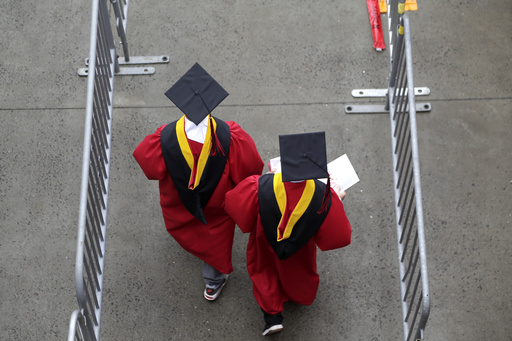Americans are becoming increasingly doubtful about the value and cost of college, with a majority indicating they believe the U.S. higher education system is heading in the “wrong direction,” as per a recent poll. Only 36% of adults express a significant level of confidence in higher education, a decline from 57% in 2015, according to a report released by Gallup and the Lumina Foundation. This skepticism is seen across various demographics, including gender, age, and political affiliation.
Enrollment in colleges is dropping, influenced by concerns related to the student debt crisis, high tuition costs, and debates about curriculum content. The decreasing confidence in the worth of a college education is evident across party lines, with Republicans showing a significant decline in confidence compared to Democrats and independents. A registered Republican in Connecticut, Randy Hill, expressed his skepticism, mentioning the high costs of college and doubts about the job market value of traditional education.
Experts warn that a reduction in college graduates could exacerbate labor shortages in various fields, leading to lower lifetime earnings for those without degrees. The survey also revealed that the percentage of adults expressing little or no confidence in higher education is nearly equal to those with high confidence, indicating a shifting opinion on the matter. Concerns about college expenses and the perceived lack of practical education are some reasons cited for diminishing confidence.
Additionally, respondents expressed worries about political bias, indoctrination, and the perceived liberal leaning of colleges. Political viewpoints played a significant role in shaping opinions, with 41% of respondents lacking confidence in higher education citing political agendas as a reason. More than two-thirds of respondents believe college is on the “wrong direction,” and interestingly, more individuals showed confidence in two-year institutions compared to four-year colleges.
One California college student, Kristen Freeman, highlighted the cost-effectiveness of two-year programs and viewed higher education as a means to develop critical thinking skills and bring about systemic change. Freeman emphasized the importance of learning about the world and acquiring practical skills, even amidst concerns about the college system. The survey, which aimed to uncover reasons behind the declining confidence in higher education, sheds light on the complex attitudes and challenges faced by the sector.


